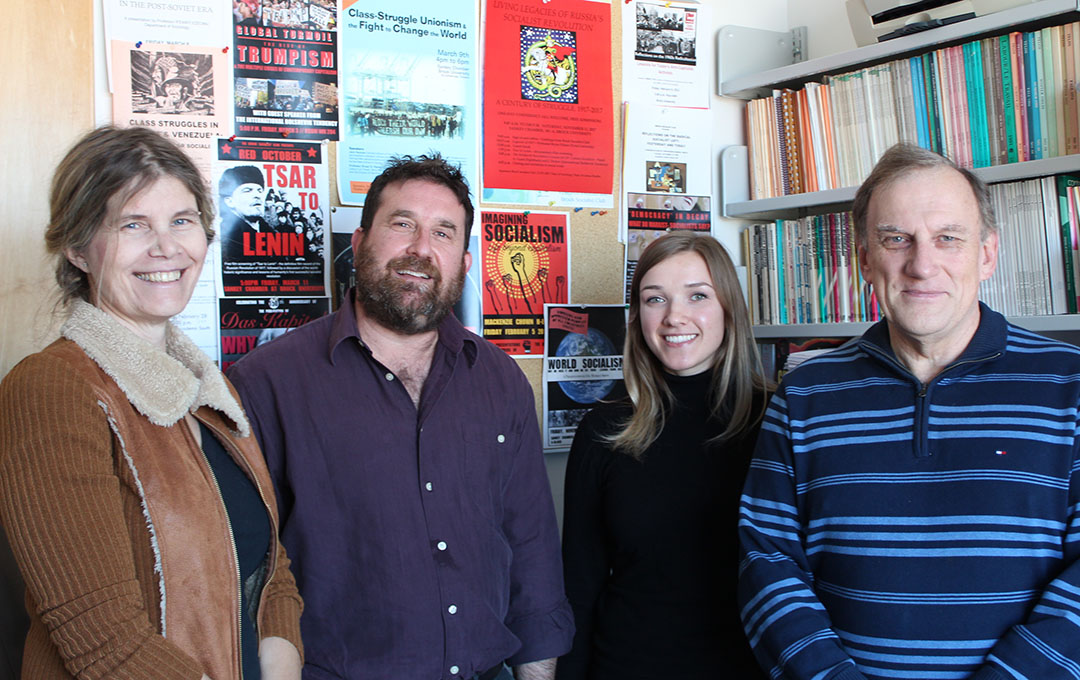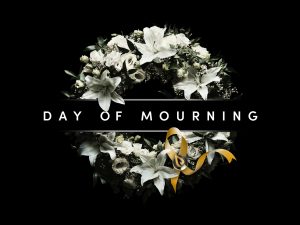 Karen Hofman, of the Brock Socialist Club, Jonah Butovsky, graduate student Emily Dziuba and Murray Smith have come together to organize a conference on the Russian Revolution taking place Saturday, Nov. 11 at Brock.
Karen Hofman, of the Brock Socialist Club, Jonah Butovsky, graduate student Emily Dziuba and Murray Smith have come together to organize a conference on the Russian Revolution taking place Saturday, Nov. 11 at Brock.A conference held at Brock this weekend will examine the legacies and lessons of the Bolshevik Revolution of 1917.
Living Legacies of Russia’s Socialist Revolution, organized by Associate Professor Jonah Butovsky and Professor Murray Smith in the Department of Sociology, will have participants exploring what the revolution meant then, as well as what it means today.
“Russia’s socialist revolution addressed the most urgent challenges facing workers and peasants in the Russian empire a century ago — war, material deprivation, glaring class inequalities, tyranny, national oppression and so on — while also pointing the way forward to an egalitarian-socialist future for all of humanity,” explains Smith. “In our view, those challenges remain very much with us today.”
Butovsky agrees that reviewing the events of 1917 can help present-day scholars see a way forward.
“Many of the great ideals of the early years of the revolutionary government were soon betrayed by an increasingly corrupt bureaucratic oligarchy headed by Joseph Stalin,” Butovsky asserts. “Even so, we think it is a huge mistake for socialists — and all those looking to secure human well-being and flourishing in the 21st century — to discount the important lessons offered by the Russian revolution for bringing about transformative change.”
The conference begins with an address by Bryan Palmer, an internationally recognized expert in labour studies, socialist history and Marxist theory who taught for many years at Queen’s University before becoming a Canada Research Chair at Trent University.
After a break for lunch, participants have the opportunity to see Tsar to Lenin, a documentary film originally released in 1937 but then hidden from view for some 75 years, until its DVD release in 2012.
According to Smith and Butovsky, the documentary constitutes the definitive film record of the key events of the Russian Revolution.
“When Tsar to Lenin was first released, Stalin’s regime did everything in its power to suppress it because it told the truth about the key role played by Leon Trotsky, alongside Lenin, in leading the revolution and establishing the Soviet government,” says Smith. Trotsky was exiled by Stalin in 1928 and assassinated in 1940.
Butovsky points out that the story behind the film is also telling. “The longtime disappearance of Tsar to Lenin was bound up with the determination of Stalinists and capitalists alike to falsify the real history of the Russian revolution, and to firmly entrench the fatally false idea that Stalinism was the legitimate continuator of Lenin’s Marxism.”
The conference concludes with a panel discussion on how present-day socialists can learn from historical events. The panel features presentations by Alex Grant, representing the International Marxist Tendency and its Canadian affiliate Fightback, and Josh Decker, representing the International Bolshevik Tendency.
The conference, sponsored by the Brock Socialist Club, CUPE 4207, the Department of Sociology and the Department of Labour Studies, takes place Saturday, Nov. 11 from 9:45 a.m. to 5 p.m. in Sankey Chamber. Advance registration is not required, and all are welcome to attend.









